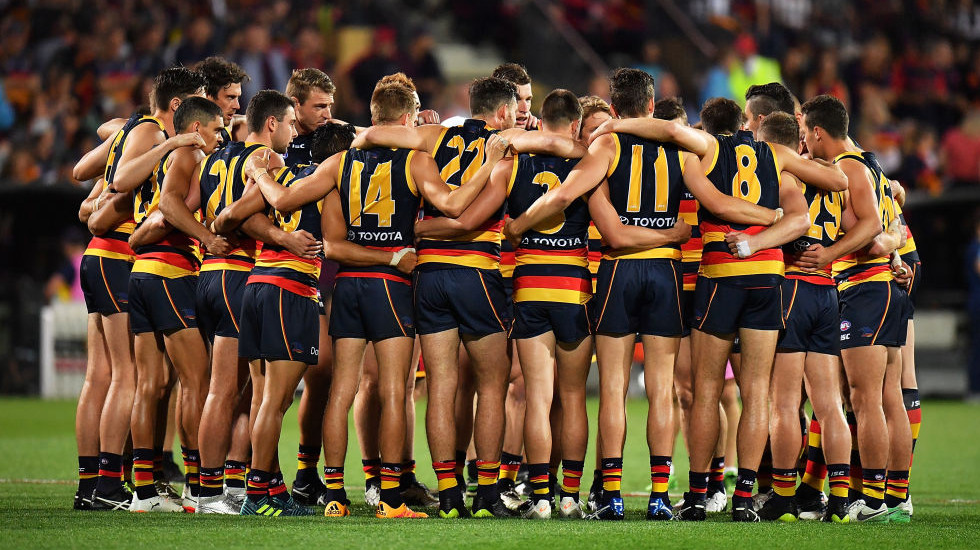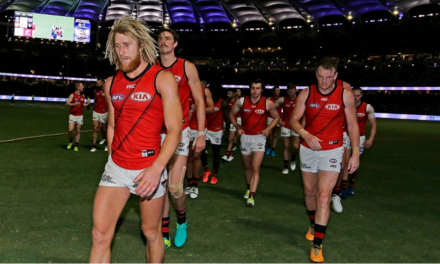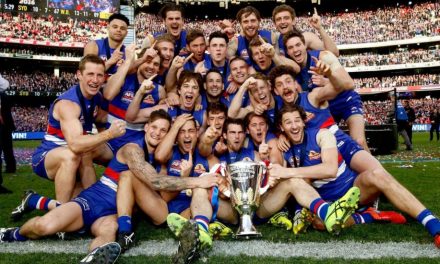In close: Adelaide is a club full of character and resilience, having survived tough times and almost unfathomable tragedy. Photo: GETTY IMAGES
Crows have a pretty good grand final story to tell, too
Anyone living in Melbourne this week will be familiar with the great story that is Richmond’s return to the AFL grand final stage.
To say the Tigers, boasting one of the largest and most passionate support bases in the competition, have done it tough since their last premiership back in 1980 would be some understatement.
They’ve stuck fat through near financial ruin, administrative upheavals, coaching merry-go-rounds, wooden spoons and repeated disappointment over nearly four decades since then. This week is their reward.
A truly romantic grand final plot would dictate that Richmond squares off in Saturday’s grand final against a soulless and unpopular villain, a definition of good versus evil. But it’s not quite the case.
Because Adelaide, whilst only a construct of the AFL era, and born hastily in reaction only to the SANFL version of Port Adelaide’s audacious bid for an AFL licence back in 1990, is a club also chock full of character, and with a great story to tell.
Having successfully stymied the Port Magpies’ AFL bid back then, the Crows suddenly found themselves having to put not just a team but an entire club together from scratch. Unlike newer AFL entrants, they didn’t have the luxury of an entry date a couple of years down the track, more like a few months.
Players, officials and fans were thrown together in one giant melting pot of blue, red and gold. But right from the start, something clicked. And unlike some of those other newer AFL entities, the Crows have always felt like a genuine old-fashioned footy club.
It wasn’t always apparent to those outside early on. Particularly in Victoria, where after just seven seasons in the competition, Adelaide in 1997 famously denied the long-suffering St Kilda, the archetypal Cinderella club, what would have been only a second premiership in 100 years in league company, and themselves ran away with the spoils.
The dream-busters did it again the following year, this time coming from fifth spot on the ladder and charging home on grand final day as North Melbourne kicked themselves out of a grand final victory.
But if that perpetuated a belief among the establishment that Adelaide had been blessed with premiership success without having to serve much of an apprenticeship or pay its dues, even that it couldn’t properly appreciate the meaning of a premiership without having ever done it tough, it’s no longer the case.
Time marches quickly in football, but that’s now nearly two decades ago. And while it’s hardly on the Richmond scale, Adelaide has done it tough, too.
On the field, the Crows haven’t plumbed the depths of the AFL ladder like others. But there have been repeated disappointments. Four times before last Friday night’s win over Geelong, they slogged their way through to a preliminary final only to pull up short.
In 2005, they finished the regular season on top of the ladder and didn’t even get the chance to grace the MCG on grand final day, blowing a home final against St Kilda. The next year, they blew a home preliminary final against West Coast.
There was another false dawn, and another heartbreaking preliminary final loss by a kick under the coaching of Brenton Sanderson in 2012. But it’s what has happened since then which has truly defined Adelaide as a remarkable club full of resilience and character.
The halo of AFL favour certainly slipped at the end of that year when the club was slapped with draft penalties, fines and suspensions of officials over secret wage deals with former Crow forward Kurt Tippett.
Adelaide copped its whack and simply got back on the bike, a character-building exercise perhaps. And yet nothing like the scale of character the Crows have had to show since.
First, in March 2014, came the death from cancer of assistant coach Dean Bailey, who’d been with the club since late 2011. And barely a year later, the almost unfathomably tragic, senseless death of first-season coach Phil Walsh at the hands of his own son.
No AFL club has ever had to cope with a setback of that scale, midway through a season no less. Somehow, the Crows not only found the strength to keep going, but win seven of their remaining 11 matches, including a final.
They’ve made finals two seasons out of two under another new coach in Don Pyke since then, and in 2017 have been clearly the best team of the season, topping the ladder 17 rounds of 23 and now going into a grand final as favourite.
Adelaide’s fan base will make what has become a familiar trek across the border to the MCG this week, many of them driving, the Victorian provincial centre of Ballarat having become a sort of home away from home along the way.
The Crows won’t be short of support on Saturday. Nor goodwill. And if they do manage to upset the Richmond fairytale, it won’t be playing the part of villain. For this is a club no-one could dispute has now more than paid its dues, is made of real substance, and is just as much as the Tigers an intrinsic part of football’s cultural fabric.












The Victorians seem to easily discount that SA has had its own long and proud footballing history. Our own competition, vibrant with local teams. The Margarey Medal was on par with the Brownlow for prestige. The Crows club may be ‘new’ but they are a product of an ongoing tradition of this state producing quality players, many of whom in the past did great things for ‘Victorian’ clubs. Now, as do Port, they represent a State presence to the Victorians who believe they have always ‘owned’ the game.
I miss the importance and rivalry of our local comp. The state v state games were intense and a source of huge pride if selected. Times have changed but SA is no johnny-come-lately to football and any win is an ongoing story for our proud history. Despite ongoing commentary about club ‘longevity’ we are neither more or less deserving than Richmond for the rights to contest and win this game.